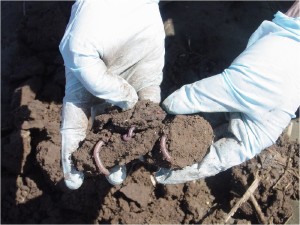Earthworm
Earthworms
Wonders of Worms
Unfortunately, the earthworm doesn’t get the admiration afforded the colorful butterfly or the cute hummingbird. But, this small slimy creature is certainly one of the most beneficial organisms you can have in your yard.

Worms perform several functions in your garden soil. Their tunneling activity helps aerate the soil. The channels they make as they move through the soil allow rain to enter the soil more rapidly, reducing runoff and the potential for erosion. This also helps improve soil structure by creating a loose soil that is easily penetrated by roots.
Worms increase the nutrients available in the soil for plants. As worms digest plant material, their castings or excrement concentrate nutrients. Castings are several times higher in nitrogen, phosphorus, potassium, and Magnesium than topsoil. This nutrient rich material is mixed into the soil where plant roots can use the nutrients. Also, by incorporating litter into the soil, worms reduce the number of fungus spores on the soil surface and that can help prevent plant diseases such as apple scab.
Like all living organisms, worms need a suitable habitat in order to thrive. Here are some suggestions to improve worm habitat in your yard.
- Provide worms with organic matter for a food source. Worms eat plant residues. Mulches such as grass clippings or leaves will provide a food source. Mulches also will help moderate soil temperatures in the summer, making the upper layers of the soil more desirable for worms.
- Worms, as well as plants, do best with moderate levels of soil moisture. Too much or too little moisture is bad for both worms and your plants.
- Reduce your use of pesticides. Fungicides are especially toxic to many worm species.
- Use fertilizer carefully. Not only can excessive use of fertilizer contaminate water, but also some studies have shown that excessive nitrogen fertilizers may harm populations of certain worm species.
- Reduce tillage in your garden. Numerous studies have shown that earthworms are disturbed by tillage. Too much tillage reduces organic matter needed as a food source and can decrease soil moisture.
- Maintain a pH (the acidity of the soil) near 7. While some species can tolerate a wider range of soil pH, most worms do best when pH is near neutral.
While worms might not be the most attractive species of wildlife to have in your yard, they can be one of the most helpful. Treat them right and they will return the favor by improving your soil for healthy plant growth.
For more information on nutrient management, mulching, and other Backyard Conservation practices, contact your local conservation district or the Natural Resources Conservation Service. Or call 1-888-LANDCARE (toll free) for a free colorful Backyard Conservation booklet and tip sheets.